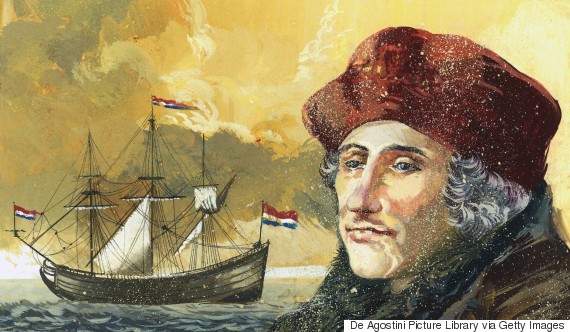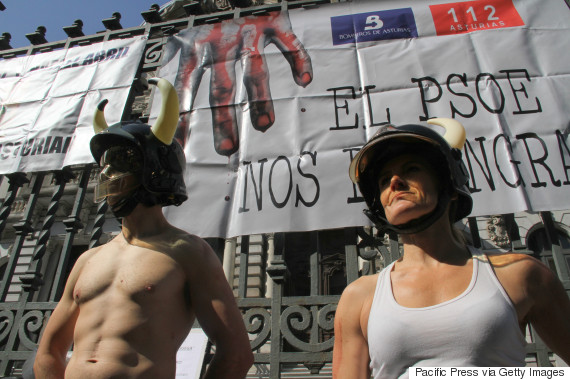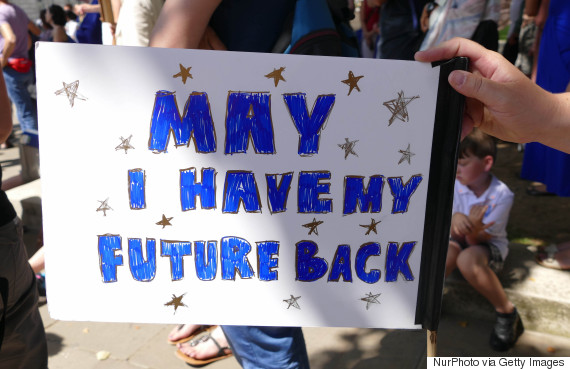
BERLIN -- As the philosopher Baruch Spinoza once said, there are two ways to approach complex systems. The first regards things in the spirit of what is temporary or provisional (sub specie durationis), while the second transcends time (sub specie aeternitatis). For a political system, the provisional view describes the politics of the day, the project that must be kept on course, while the time-transcendent view formulates an idea, a utopia, the summum bonum -- the highest good.
From the standpoint of the provisional, Europe exists as a political entity, as its public administration -- a system that, like all systems, is judged by its self-preservation. Innovation is the enemy, and tenacity wins. An administration lives from its well-established procedures and responsibilities.
In contrast, thinking about Europe as a utopia expresses the ideas that foster innovation and keep pace with the changes that the future will bring. This means nothing more than the combined wellbeing of the greater community, which some would argue is the summum bonum.
The argument that peoples who share a common currency will never again wage war against each other is as simple as it is true.
The vision of a united Europe is nothing new. Centuries before the Europe we know today was built up out of the rubble of the World War II and the Holocaust, Erasmus of Rotterdam had already dreamed the same dream. He wished for the people of the Old World to unify and be drawn together in the spirit of Christian humanism, but the religious wars of the Reformation would destroy his utopia. For more than a century, Europe sank into chaos and death before a new start was made possible with the Peace of Westphalia. The peace settlement after the World War II was also successful -- it combined today and tomorrow, project and utopia, in outstanding ways.
What does this mean in concrete terms? The argument that peoples who share a common currency will never again wage war against each other is as simple as it is true -- on the provisional as well as the higher level. For this reason, the primacy of the political realm in the European Union was always proper and essential. Creating the euro was the correct choice, even though its practical implementation was tied to many questions that lay still in the future. The summum bonum was the preservation of a comprehensive peace. This end justifies all the means.
Future generations of historians will argue over the question of when the entanglement of the provisional and the transcendent was broken. Clearly this decoupling of the two spheres has begun; it's especially noticeable in the rhetoric used to discredit the European Union.

Opponents of the EU brandish the term "European project" as if it were a curse word. By emphasizing the provisional nature of the word "project," they reduce and discredit the whole, which the temporary provisions form with the timeless goal. At the same time it is those very provisions, the functionality and the calmness of public administration, that keeps conflict-accelerators like nationalism and religion under control. Bluntly put: all of the EU's banana curvature standards maintain peace, not dispose of it. Peace is the sovereign of Europe, not the nation-state.
But the populists fear this sovereign. For them the Union is too bland. There's not enough oomph behind it. Because of that they evoke the danger of the external enemy, of Islam, and the individual nation and Christianity are staged as the bulwark against it. A mediating force, a secular and sober administration, is not considered helpful.
The lost youth
The youth no longer understand the European narrative because they haven't experienced a war -- this is an argument brandished by those who wish to shake the timeless validity of the narrative, those who want to assert their tough interests. It applies to all the new right-wing populist movements and parties.
Every success has its detractors. Europe is a success -- that is why it has enemies, both in the Kremlin as well as inside its own borders. It is true that the youth today have it more difficult than in past generations. And when in countries like Spain the youth unemployment rate is near 50 percent, then that is not to be accepted. But at the same time, it is also true that ending the peace would bring about no economic recovery. And as we now see in the case of Brexit, leaving the European Union brings about the particular worry of economic setbacks.

The elites are at fault for the failure of Europe, the populists say. Both parts of this statement are false. Europe hasn't failed! The Union did not win the Nobel Peace Prize as some gold star for its efficient administration, but because it laid out a lasting order on a continent that would be remembered for eternity.
Everything that the EU does must protect and preserve the state of peace. For this reason, absorbing Eastern European countries was so important. And it was also correct to try to bring Russia into closer cooperation with the institutions of Europe and the West.
The democratic deficit of the EU, in turn, is owed to the fact that all countries, regardless of their size and population, are equal before the law and operate thusly. Nearly everything is decided in a council, in which sit democratically elected heads of state. That is absolutely proper if one keeps the European utopia in view. The equal ranking of all members ends the proportional political representation based on ethnicity and religion -- in other words, the two elements that were responsible for the destructive wars of the past, nationalism and religious fanaticism.
Europe hasn't failed!
The deepest crisis currently facing European democracy appears to lie with the citizens of Europe. Many people have been blinded against rational argument out of fear of immigration and dread of Islam. The question suggests itself as to whether democracy itself shouldn't be suspended during a time when the electorate does not have the capacity to think clearly.
The continent's residents are citizens, not consumers. They are invited to participate, to exercise their civic duty and to take up their civil rights, but their mentality, rather, is to let others simply dictate what is good for them. That is the only reason why the Farages, the Johnsons, the Le Pens, the von Storches and the Wilders are so successful: because citizens do not check their claims and they let themselves be lied to.

The populists also say that one can be European without the Union and still operate in Europe. The opposite is true. Europe is the European Union. The supposedly unifying elements of all European peoples -- Christianity, the philosophy of the ancients, humanism and the Enlightenment, to name just a few -- have existed for centuries on the European continent. But that has never stopped the brotherly Christian nations from waging heinous wars against one another.
What can we conclude from this? Both lines of the European Union -- the here and now and the lofty utopic principles -- must once again be thought of together lest Europe flies apart. This is particularly the challenge for the political class, as it is a question of the language used and the contexts in which it is to be spoken.
Apathetic citizens are the problem
What happens when the connection between speech and action no longer exists? This was abundantly clear during the refugee crisis. The EU -- as a community of values, of human rights, of solidarity -- stopped counting for many of its member states. For many politicians, the next election was more important than basic principles, the summum bonum. "First comes a full stomach, then comes ethics," said the German poet and playwright Bertolt Brecht. First the reelection, then politics of substance.
The populists in turn discredit knowledge and expertise. They drive the liberal parliamentary democracy and its actors before themselves. They define the here and now for their own utopias. In the Brexit discussion in the U.K., right-wing populists invoked the Commonwealth as an alternative to the EU. The Commonwealth is a construct from the past, one that has, for half a century, had no sway. But it was built and sold as a powerful counter image to the EU.
The electorate let themselves be lured by the short-term accomplishments of the day. That is a sad piece of the truth. The EU has no elite problem, but rather a problem, particularly in Western Europe, with a thoroughly sedated, consumerist and apathetic population. In this mindset, sad figures like Geert Wilders or Marine Le Pen resonate.
Europe needs a new elite: in politics, in the economy, in culture, in the media. One that is prepared to not just tell people what they want to hear, but to communicate, to embody and to represent the credible present and the future with a coherent, comprehensive image. The populists are not the partners of the people. They want destruction and the reevaluation of our values, chaos, anarchy and, in order to be understood by all, the much-invoked "Decline of the West."
Earlier on WorldPost:

